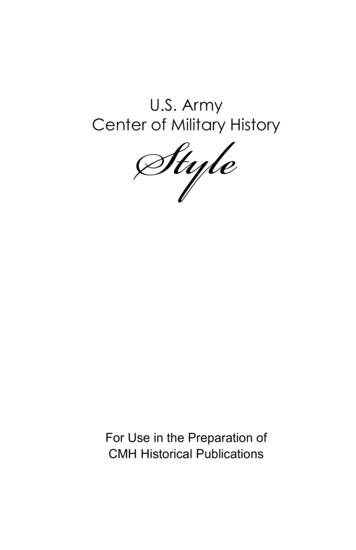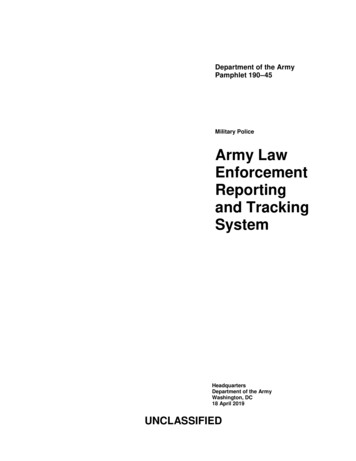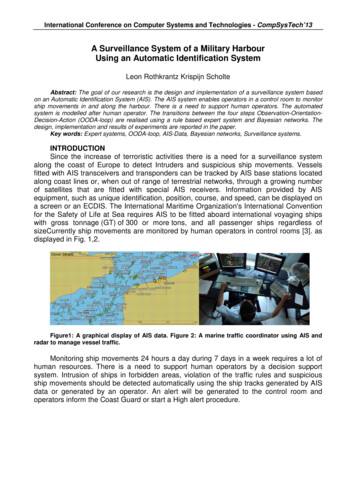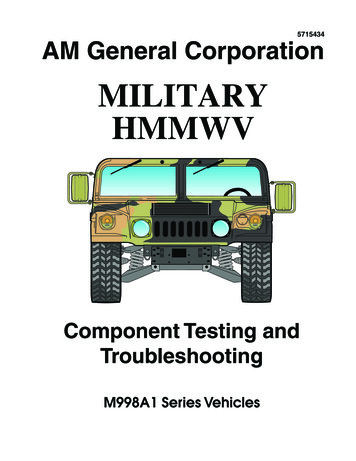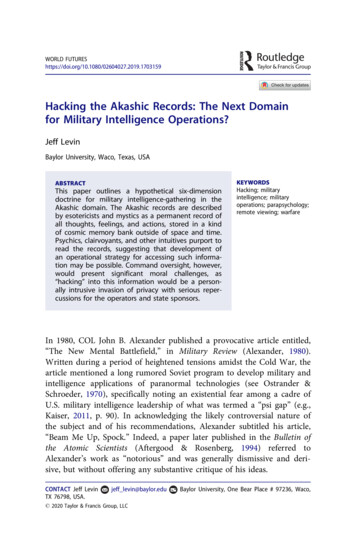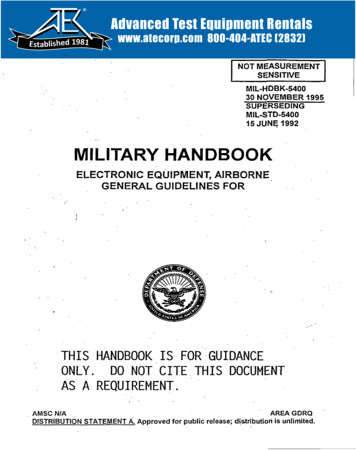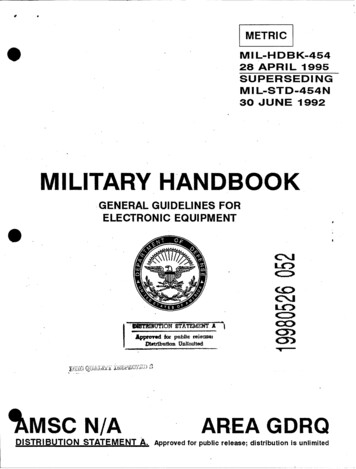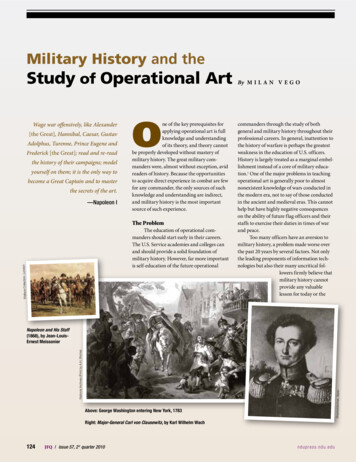
Transcription
Military History and theStudy of Operational ArtWage war offensively, like Alexander[the Great], Hannibal, Caesar, GustavAdolphus, Turenne, Prince Eugene andFrederick [the Great]; read and re-readthe history of their campaigns; modelyourself on them; it is the only way tobecome a Great Captain and to masterthe secrets of the art.—Napoleon IOne of the key prerequisites forapplying operational art is fullknowledge and understandingof its theory, and theory cannotbe properly developed without mastery ofmilitary history. The great military commanders were, almost without exception, avidreaders of history. Because the opportunitiesto acquire direct experience in combat are fewfor any commander, the only sources of suchknowledge and understanding are indirect,and military history is the most importantsource of such experience.The ProblemWallace Collection, LondonThe education of operational commanders should start early in their careers.The U.S. Service academies and colleges canand should provide a solid foundation ofmilitary history. However, far more importantis self-education of the future operationalBy M i l a n V e g ocommanders through the study of bothgeneral and military history throughout theirprofessional careers. In general, inattention tothe history of warfare is perhaps the greatestweakness in the education of U.S. officers.History is largely treated as a marginal embellishment instead of a core of military education.1 One of the major problems in teachingoperational art is generally poor to almostnonexistent knowledge of wars conducted inthe modern era, not to say of those conductedin the ancient and medieval eras. This cannothelp but have highly negative consequenceson the ability of future flag officers and theirstaffs to exercise their duties in times of warand peace.Too many officers have an aversion tomilitary history, a problem made worse overthe past 20 years by several factors. Not onlythe leading proponents of information technologies but also their many uncritical followers firmly believe thatmilitary history cannotprovide any valuablelesson for today or theStaatsbibliothek, BerlinNational Archives (Print by A.H. Ritchie)Napoleon and His Staff(1868), by Jean-LouisErnest MeissonierAbove: George Washington entering New York, 1783Right: Major-General Carl von Clausewitz, by Karl Wilhelm Wach124 JFQ/ issue 57, 2 d quarter 2010n dupress.ndu.edu
VEGOis apt to make and to repeat. It teaches itsstudents how to learn by the experience ofothers.7History is a highly vigorous and intellectual discipline. Through the process ofexplanation and its use in the time dimension, history examines the development ofhuman institutions and attitudes. Political,economic, and social ideas do not emergefrom a vacuum. They are given meaningonly by the circumstances within which theyoccur. They also do not spring from sources ofeternal truth; they are conceived in the mindsof humans who contribute to and are affectedby specific events.8 History gives its readers aconsciousness of particular circumstances infuture. Despite all the experiences of previousgenerations, military history is consideredessentially irrelevant in the information era.Historical examples are sometimes willfullydistorted and even intentionally falsified toprove preconceived notions on the importance of advanced technologies in the conductof war.What Is Military History?All too often, history is considered theexclusive preserve of professional historians.Yet it is inherently broader, deeper, and morediverse than the study of any other area ofhuman activity.2 It encompasses every aspectof the experience of humanity,3 and it tendsto broaden the vision and deepen the insightsof its readers. Events are seen as part of amuch broader framework filled out withcomplex and dynamic interrelationshipsof social forces, individuals, location, andtiming.4 B.H. Liddell Hart, for instance, wrotethat history is:is fundamental to preparation for the nextwar, for current military problems cannot besolved without an understanding of the pastfrom which they stem.12Military history must be more than alogical, factual, and frank record or accountof events. Above all it must be accurate. Carlvon Clausewitz aptly observed that militaryhistory has value when it “always presentshistory serves as a foundationof education because it showshow mankind repeats its errorsand what those errors areSharpshooter’s fate at Gettysburg, July 1863History serves as a foundation of education because it shows how mankind repeatsits errors and what those errors are. Frenchhistorian Marc Léopold Benjamin Bloch(1886–1944) observed that history is, in itsessence, the science of change. History teachesthat it is impossible ever to find two eventsthat are exactly alike because the conditionsfrom which events spring are never identical.5The true purpose of history is todescribe the truth. However, a pure truth isnever unalloyed. History can only provideobjective truth as closely as possible.6 It canonly show us the right direction but cannotprovide details in regard to how we shouldreach a final destination. It can also showus what to avoid, but it cannot tell us how toavoid. At the same time, history can highlightthe most common mistakes that mankindDr. Milan Vego is Professor of Operations in theJoint Military Operations Department at the NavalWar College.ndupres s.ndu.eduWar Department (Alexander Gardner)the record of man’s steps and slips; it shows usthat the steps were slow and slight; the slips,quick and abounding. It provides us with theopportunity to profit by the stumbles andtumbles of our forerunners. An awareness oflimitations should make us chary of condemning those who made mistakes, but we condemnourselves if we fail to recognize mistakes.human affairs. It teaches them to be wary ofbroad generalizations and quick solutions.9Military history is a part of generalhistory. No matter one’s attitude toward war,it is an integral part of the human history.There has never been a century without a war,and never has there been a peace that lasted100 years.10 But after the end of World War II,the world entered an era of almost continuous low-intensity conflicts, while there wereonly a few high-intensity conventional wars.The 3,500 years of military history is the onlyacademic study that provides the totality ofthe phenomena of war.11 A study of past warsthe truth, the entire truth, and nothing butthe truth.”13 However, people in general areunwilling to admit the truth if it disturbstheir comfortable assurances. The mostdangerous of all delusions are those thatarise from the adulteration of history in theimagined interests of national and militarymorale.14 Historical accounts that glorifyvictories and gloss over or omit failuresare worthless to students who are seekingto improve their ability as leaders in war.Hence, to be of any value, history must giveall the facts, pleasant and unpleasant, aboutthe campaigns at hand.15issue 57, 2 d quarter 2010 / JFQ 125
RECALL Military History and Operational Arton how closely it approaches the definitionand method of studying it.18 Among otherthings, its study provides a commander witha core of background knowledge and understanding that allows him to form and reformhis vision of the battlefield beyond the realmof his combat experiences.19 Planning gamesand wargames, field trips, and exercises areexcellent tools for improving the quality ofoperational and tactical training. However,only the study of military history can provideinsights into all aspects of warfare.20The greatest danger for the properapplication of historical knowledge is propagandistic and censored history. Such historiesare more commonly written in totalitarianor authoritarian societies. However, suchdistorted views of events are unfortunatelyoften written in democracies. Propagandaas history will rouse defeated nations to newactivity. Victors, on the other hand, like toexaggerate the extent and importance of theirsuccesses. The main purpose of a propagandistic history is to make everything appear inits own grammar, and the grammatical rulesare deduced from studying military history.Because few commanders have experiencecommanding forces at the operational level,the best way to educate them to think operationally is through the study of the successesand failures of great military leaders.The study of military history provides abroad perspective on events and gives a senseof proportion in relation to time, place, andcircumstances.27 Methods of accomplishingoperational or strategic objectives in the pastWar of the Nations (New York Times Co., 1919)military history provides a commander with backgroundunderstanding that allows him to form and reform his vision ofthe battlefield beyond the realm of his combat experiencesGerman submarine captured by Allied forces,World War Ithe most favorable light. Such a history mightbe politically necessary, but it is also dangerous.16 In fact, such a history is not history atall. Among other things, it cannot providesound lessons or serve as the basis of intellectual and professional education. It fostersone of the worst evils in professional militarythinking—self-deception.17 Perhaps one ofthe worst examples of propagandistic militaryhistory was the Soviet history of the GreatPatriotic War (1941–1945) written during Stalin’s era and even well into the late 1980s. Allof the writers paid the greatest tribute to theSoviet dictator Josef Stalin, a leader who nevermade a mistake. The Red Army performedsuperbly and without fail. But even after theend of Stalin’s era, the Soviet history of WorldWar II remained heavily propagandistic intone and content. Hence, even if some eventswere truthfully presented, it was difficult todistinguish fact from fiction.The Importance of Military HistoryThe basis of military education is toprovide mental development for future commanders. Its practical value is the trainingand mental development of soldiers. Thebenefits of studying military history depend126 JFQ/ issue 57, 2 d quarter 2010Prussian General Johann David vonScharnhorst (1755–1813) firmly believed in thevalue of military history for creating a new typeof highly educated officer.21 Napoleon I (1769–1821) observed that on the battlefield, whatone believed to be a happy inspiration provedto be merely a recollection.22 Field MarshalHelmuth von Moltke, Sr. (1800–1891) was anavid reader of history.23 He reportedly used hisknowledge of past military events in preparingplans for his campaigns.24 However, Britishfield marshal Sir Archibald Wavell (1883–1950)held a different view. He believed that studyof psychology and leadership are of greaterimportance to a military man than the studyof operations. Wavell asserted that the militarysuccesses of Napoleon I could be attributed tohis knowledge of psychology rather than tohis study of rules and strategy. Yet Napoleonhimself said that the knowledge of the higherart of war is not acquired except by experienceand the study of history of wars and the battlesof great captains.25A full understanding of the relationshipbetween policymakers and operational commanders can be obtained by studying militaryand political history. The future operationalcommander must fully understand the political strategic objective and strategy and policybefore he can start to understand variousaspects of operational art. That understandingand knowledge can essentially be acquiredonly through the critical study of past wars andmajor operations and campaigns.26This critical study of past wars—campaigns and major operations, in particular—is a primary source for developing the operational perspective of future commanders.Warfare does not have its own logic, but it hasmight be obsolete today, but the fundamentalsof strategy or operational art remain essentiallythe same as they were in the recent or evendistant past. A study of history allows us todeduce tenets of operational warfare. Theconcentration of forces, for instance, affectedthe outcome of the battle at Leuctra (in Boetia)in 371 BCE, where the Thebans defeated theSpartans, in the same way it did in the Germaninvasion of France in May 1940.28A proper study of military history helpsto derive general principles of leadershipthrough a critical reading of the biographiesand memoirs of the great captains of the past.It also helps in understanding the reasonsfor their successes and failures.29 By studyingmilitary history, we can get a sense of thepressure and responsibility of commanders inuncertain situations when critical decisionsmust be made.30History can be studied to derive lessonsthat prove or negate the validity of tacticaland operational tenets and ways of using one’smilitary sources of power. So understood, it notonly contains the study of the past but also canbe useful in the future and can provide concreteinstruction for action.31 Moltke, Sr., believedthat the concrete historical conditions of amilitary success or failure must be taken intoaccount in deriving lessons. Lessons learnedfrom a study of military history should notbe dismissed because of the inherent limits ofone’s own experiences. In his view, for practicalapplication, lessons should be deduced fromtimeless tactical and strategic fundamentals.32Studying Military HistoryThe study of military history should beone of the most important parts of the curn dupress.ndu.edu
VEGOcan discern and learn the discontinuities.36Ideally, the study should focus on the historyof the art of war, which will show how and whyit has changed from era to era. A study of military history should not be limited to a certainage or area. One of the pitfalls is trying to covertoo broad a field. It would seem much better tocover a limited number of events thoroughlythan to give students a superficial picture ofthe greatest possible number of occurrences.37Hence, military history should be studied inthe danger in studying militaryhistory is that a narrow mindwill gather the formal aspectsof past successes divorcedfrom their proper contextdepth. One should read everything available onthe subject. This means that not only officialhistories should be studied but also memoirs,autobiographies, letters, diaries, and even historical fiction. Only in such a way can one hopeto learn what really happened.38 It is more valuable to know a single campaign in great detailthan several campaigns superficially.39Operational lessons learned are derivedfrom in-depth study of a large number ofmajor operations or campaigns—or casestudies. The best tactical lecture, the bestlecture on military theory, or the bestdoctrinal publication would remain dry,bloodless, and inanimate if it were notillustrated with specific examples from thepast. However, military history is not just acollection of examples. It also provides thehighest quality of nourishing material for thesoul of soldiers.40 Generally, it is a mistaketo see the past in distinct patterns, for it istrue that each student reads his own peculiarlesson according to his own peculiar mindand mood.41 Clausewitz said that if somehistorical event is being presented in orderto demonstrate a general truth, care must betaken that every aspect bearing on the truthat issue is full and circumstantially developedand carefully assembled before the reader’seyes; otherwise, the proof will be weakened,and it will be necessary to use a number ofexamples to provide the evidence missing inthe first event. 42 The larger the number ofexamples, the more reliable the results andthe more likely that sound lessons will bederived. Very often, this method is abusedby citing many examples without providingmany details. Such an approach can providea superficially strong proof, but one withoutmuch substance. There are some aspectsof war for which one may present a dozenexamples to support a certain theory andthe same number of examples to prove justthe opposite. Clausewitz wrote that a singleevent, thoroughly analyzed, might be muchmore instructive than one that is superficiallytreated. He observed that the danger in asuperficial treatment lies in the fact that, inmost cases, he who writes in such a mannerhas never mastered the events he cites—therefore, such superficial, irresponsible handling of history leads to hundreds of wrongideas and bogus theorizing.43The emulation of historical exampleshas often been used to save time and resourcesor to win bureaucratic battles in support of aU.S. ArmyU.S. Navy (Obie Newcomb, Jr.)riculum in all Service academies and colleges.However, future operational commandersand planners will never fully master thiscritical subject unless they devote considerable effort to self-education throughout theirprofessional careers. They should be studentsof history, not historians—a big differenceexists between the two. The better educatedthe commander, the more he understands thebigger picture and the better he will performhis responsibilities (provided that the commander has the essential qualities of character).33 This implies that study of militaryhistory should be methodical and long term.The most recent wars should be studied firstbecause they are most relevant for the currentsituation and will be for some time.A serious study of military historymust be accompanied by study of thegeneral history of the period and settingunder consideration.34 In studying militaryhistory, one should analyze all the eventsin their entirety; otherwise, events that infact portend trends for the future might beomitted from analysis. The real danger instudying military history is that a narrowmind will gather the formal aspects ofpast successes divorced from their propercontext. The most obvious reasons forvictory are often the most unreliable andworthless guides for future action. As onenaval historian aptly observed, “Thosewho have blindly followed the easy path ofthoughtless imitation have often ended indire disappointment.”35Military history should be studied inwidth, depth, and context. By studying warfarein width—that is, over a large timeframe—oneU.S. Soldiers march into Germany through the Siegfried Line, 1945ndupres s.ndu.eduMarines storm Tarawa in Gilbert Islands, November 1943issue 57, 2 d quarter 2010 / JFQ 127
RECALL Military History and Operational Arta theoretical construct; rather, he used navalhistory to derive lessons that could be universally applied. Mahan’s ideas on the superiorityof capital ships, decisiveness of major navalbattles, and irregular and indecisive nature ofcommerce destruction were accepted almostwithout question as the foundations uponwhich to build navies. At the same time, hisstrong support for convoying as the mosteffective method for protection of shippingwas virtually ignored.46Another pitfall in studying militaryhistory and deriving lessons is in focusing ona single defining moment and then absolutizing its significance at the expense of all others.In studying military history, one should avoidapplying a historical example of one era tocompletely changed contemporary conditions,as Chief of the General Staff Field MarshalAlfred von Schlieffen (1833–1913) did. Despitehis great intellect and erudition, he committedfatal errors in interpreting the lessons of military history. Among other things, he becamefixated on a single solution to a complex strategic problem: the defeat of France at one fellswoop. Schlieffen considered the example ofthe envelopment maneuver at Cannae in 216BCE as the main tenet for transforming one’sNational Archivesspecific solution. More often than not, theseso-called lessons entrapped those who tried toapply them without recognizing the changesin conditions that occurred with the passageof time.44 The greatest disservice to historyand its lessons comes from its frequent association with a given set of military principlesor doctrine, as Antoine-Henri de Jomini(1779–1869) did in studying 30 campaigns ofFrederick the Great (1712–1786) and Napoleon I. He deduced (erroneously) certain fixedmaxims and principles that he claimed wereboth timeless and universal in application.45A latent danger in studying militaryhistory is to derive lessons that might havebeen correct for a given historical era but thathave become inappropriate or entirely false forthe problems of the day. It is even more seriousto continue to rely on such lessons withouttrying to adjust, refine, or even abandon themin light of the new situation. For example, thewritings of Rear Admiral Alfred T. Mahan(1840–1914) are a classic example of lessonsthat not only were uncritically accepted butalso were dogmatically followed long aftertheir utility passed. Mahan was essentially nota theoretician but a historian of seapower. Hedid not use historical examples to illustrateown strategic inferiority into relative operational superiority at a decisive point.47 Hisbiggest mistake was to raise experiences froma single decisive battle to a strategic concept.In effect, Schlieffen tried to transfer the experiences of preindustrial wars—the Punic Wars(264–146 BCE), Seven Years’ War (1756–1763),and Napoleonic Wars (1805–1815)—to thecompletely new circumstances of major warsin the industrial era. At the same time, heneglected to draw lessons from the AmericanCivil War (1861–1865) and the Russo-JapaneseWar (1904–1905).48In studying military history, diversesources should be used, ranging from officialand semiofficial histories, autobiographies,biographies, and social history to reminiscences of simple soldiers. Biographies of greatcaptains are generally more objectively writtenthan autobiographies. The books and articleswritten by war correspondents and journalists can have a great value for any student ofhistory. Also, historical novels can be quiteuseful.49 General George Patton (1885–1945)said that to be a “successful soldier you mustknow history, read it objectively. Dates andeven minute details of tactics are useless. . . .you must also read biography and especiallyone should avoid applyinga historical example of oneera to completely changedcontemporary conditionsGenerals Omar Bradley, Dwight Eisenhower, and George Patton at Bastogne, 1944128 JFQ/ issue 57, 2 d quarter 2010autobiography. If you will do it you will findwar is simple.” The most useful histories of pastwars are those written from an operationalperspective. Unfortunately, such histories aresorely neglected, and relatively few have beenwritten. Histories written during the life ofthe actors or too near their era are generallytinged with prejudice, colored by self-interestedflattery, and influenced by the selection andtreatment of source material. Histories writtentoo long after the time of participants are oftenfictional and sentimental.50Yet for all its proven value, the study ofmilitary history should be approached skeptically. Those studying it should be aware thatthey are studying not necessarily what reallyhappened, but rather what historians sayhappened. In studying history, there is one’sjudgment, but there are no formulas, tenets, orrules. Military history cannot and should notprovide a precise determination of norms forthe future. The contradiction between theoryn dupress.ndu.edu
VEGOand practice can be bridged only when theoryis understood as contemplation and not as alesson.51 Clausewitz believed that the purposeof studying war was to hone judgment beforethe battle, not to dictate decisions during it.He was adamant that the study of militarytheory, and by extension military history,should guide the commander in his self-education, not accompany him to the battlefield.52Clausewitz warned against misusing historyby expecting to provide a school solutionrather than to educate the mind of the military commander to expect the unexpected.53Experience abundantly shows the critical role and importance of comprehensiveunderstanding and knowledge of militaryhistory for all officers, and especially forthose who aspire to or are selected to take thehighest duties in their respective Services.Almost without exception, successful operational commanders have been serious students of history. Because the life of any officeris too short, the opportunities for acquiringoperational perspective by commanding largeforces in combat are rare indeed. Yet the broadview and solid knowledge and understandingof the art of war must be obtained in peacetime. It is too late to obtain that knowledgeonce the hostilities start. Moreover, operational perspective is a prerequisite for successful command at the operational level not onlyin war but also in time of peace. The mostimportant and proven source of that indirect experience is military history. A futureoperational commander should approach thestudy of military history systematically and asa lifelong effort; otherwise, the results will bewanting. JFQNotesPaul K. Van Riper, “The Use of MilitaryHistory in the Professional Education of Officers,”Marine Corps Gazette (February 1994), 50.2Herbert Richmond, National Policy andNaval Strength and Other Essays (London: Longmans, Green, 1934), 279.3C.B. Mayo, “The Study of History for NavalOfficers,” U.S. Naval Institute Proceedings (November 1921), 1757.4William E. Simons, “The Study of Historyand the Military Leader,” Military Affairs 26, no. 1(Spring 1962), 25.5Eugenia C. Kiesling, Arming Against Hitler:France and Limits of Military Planning (Lawrence:University Press of Kansas, 1996), 121.1ndupres s.ndu.edu6Guenther Blumentritt, Writing of MilitaryHistory, MS # B–295, December 1946, Historical Division, Headquarters United States Army,Europe, Foreign Military Studies Branch, U.S.Army Military History Institute, Carlisle Barracks,PA, 7.7B.H. Liddell Hart, Why Don’t We Learn fromHistory? (New York: Hawthorn Books, 1971), 15.8Simons, 25–26.9Ibid., 25.10Blumentritt, 7.11Andreas Broicher, “Wie alles gekommen ist.Gedanken zur Bildung militaerischer Fuehrer aufdem Gebiet der Militaergeschichte,” Truppenpraxis2 (February 1995), 132.12Paul M. Robinett, “History and the MilitaryProfession,” Military Review 5 (May 1954), 17.13Max Kemmerich, “Gedanken ueber dieeigene Kriegsgeschichtliche Weiterbildung derOffiziere nach Verlassen der Kriegsakademie,” May1939, RH 16/v. 95, Bundesarchiv/Militaerarchiv(BA–MA), Freiburg, i.Br., 7.14Hart, 26.15H.E. Yarnell, “The Utility of MilitaryHistory,” Military Affairs 8, no. 1 (Spring 1944), 2.16Blumentritt, 5.17Robinett, 22.18Hart, 19.19John McDonald, General Walter Krueger: ACase Study in Operational Command (Fort Leavenworth, KS: School of Advanced Military Studies,U.S. Army Command and General Staff College,May 5, 1989), 11.20Friedrich von Cochenhausen, “Wie betreibtder Anfaenger am zweckmaessigsten Kriegsgeschichte?” Militaerwissenschaftliche Mitteilungen,Nr. 9–10, 1931, 857.21Gerhard Papke, “Was ist Kriegsgeschichte?”Wehrkunde, Nr. 8, 1961, 420.22Richmond, 289.23Simons, 22.24Papke, 418.25Robinett, 17.26Ibid., 22.27James A. Huston, “The Uses of History,”Military Review (June 1957), 27.28Norbert Hanisch, Untersuchen Sie dieoperativen Ideen Mansteins hinsichtlich Schwerpunktbildung, Ueberraschung, Initiative undHandlungsfreiheit an den Beispielen Westfeldzug1940 (Sichelschnitt-Plan) und Operation Zitadelle(Hamburg: Fuehrungsakademie der Bundeswehr,January 1988), 2.29Robinett, 21.30Broicher, 131.31Bruno Eikenberg, Kriegserfahrung undKriegsvorbereitung. Zur Entwicklung von Technikund Operationsplanung und der Erziehung desmilitaerischen Fuehrernachwuchses im deutschenHeer zwischen den Weltkriegen (Hamburg: Fuehrungsakademie der Bundeswehr, November 1985),1.32Gerhard Goehler, “Vom Nutzen derKriegsgeschichte (I),” Wehrkunde 11 (November1964), 592.33Hart, 285, 288–289.34Simons, 27.35Anthony E. Sokol, “The Value and Dangerof Naval History,” U.S. Naval Institute Proceedings(August 1946), 1060, 1069.36Hart, 19.37Ebbe Gyllensterne, “What Can the Study ofthe Art of War Teach Us?” trans. from Ny MilitaerTidskrift, No. 2–3, 1956, Military Review (August1956), 104–105.38Van Riper, 51.39Kemmerich, 10.40Goehler, 592.41Jay Luvaas, “Military History: Is It Still Practicable?” Parameters 12 (March 1982), 4.42Ibid., 6.43Jehuda L. Wallach, The Dogma of the Battleof Annihilation: The Theories of Clausewitz andSchlieffen and Their Impact on the German Conductof Two World Wars (Westport, CT: Greenwood,1986), 74.44James B. Agnew, “From Where Did OurAmphibious Doctrine Come?” Marine CorpsGazette (August 1979), 59.45Luvaas, 5.46Alfred R. Bowling, The Negative Influenceof Mahan on the Protection of Shipping in Wartime:The Convoy Controversy in the Twentieth Century(Ph.D. diss., University of Maine, 1980), 2.47Karl-Heinz Frieser, Blitzkrieg-Legende. DerWestfeldzug 1940 (Munich: R. Oldenbourg Verlag,1995), 416; Lothar Burchardt, “Operatives Denkenund Planen von Schlieffen bis zum Beginn desErsten Weltkrieges,” in Operatives Denken undHandeln in deutschen Streitkraeften im 19. und20. Jahrhundert, ed. Horst Boog et al. (Herford,Germany: Verlag E.S. Mittler & Sohn, 1988), 52–53.48Martin Kutz, Operative Fuehrung als Denk figur und Handlungskonzept der Heeresfuehrungder Bundeswehr. Politische und militaerfachlicheImplikationen und Gefahren der aktuellen Diskussion (Hamburg: Fuehrungsakademie derBundeswehr, Fachgruppe SozialwissenschaftenBeitraege zu Lehre und Forschung, February 1989),9.49Van Riper, 51.50Robinett, 17, 22.51“Kriegslehren. Grundsaetzliches zur Methodik am Beispiel Golfkrieg II,” OesterreichischeMilitaerische Zeitschrift 1 (January-February 1993),30–31.52Richard Hart Sinnreich, “Awkward Partners:Military History and American Military Education,” in The Past as Prologue. The Importance ofHistory to the Military Profession, ed. WilliamsonMurray and Richard Hart Sinnreich (Cambridge:Cambridge University Press, 2006), 70.53Michael Howard, “Military History and theHistory of War,” in The Past as Prologue, 12.issue 57, 2 d quarter 2010 / JFQ 129
May 05, 1989 · art of war is not acquired except by experience and the study of history of wars and the battles of great captains.25 A full understanding of the relationship between policymakers and operation
